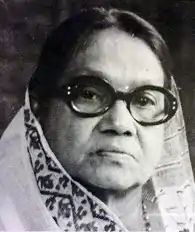Protiva Bose
Protiva Bose (also spelled Pratibha Basu; Bengali: প্রতিভা বসু) (March 13, 1915 – 13 October 2006) was a singer and one of the most prolific and widely read Bengali writers of novels, short stories, and essays.
Protiva Bose | |
|---|---|
 | |
| Born | Ranu Shome 13 March 1915 |
| Died | 13 October 2006 (aged 91) Kolkata, West Bengal, India |
Biography
She was born in a village near Dhaka in 1915[1][2][3] to Asutosh Shome and Sarajubala Shome. She was known as Ranu Shome before she married the Bengali writer, Buddhadev Bose in 1934.[1][2][4][5] She had two daughters, Meenakshi Dutta and Damayanti Basu Singh, and a son, Suddhasil Bose, who died at the age of 42.[1][6] One of her granddaughters, Kankabati Dutta, is also a well-known writer in Bengali.[3]
Bose was also a singer of popular songs. She was a pupil of Ustad Gul Mohammad Khan.[5] The poet Nazrul Islam, singer Dilip Kumar Roy, and Rabindranath Tagore admired her voice and taught her their own songs.[1][5] She made her first LP at the age of 12 and continued until the 1940s, when she gave up singing and started writing.[5][6]
Bose has written 200 books, all of which have been commercially successful.[1] Monolina was her first novel, published in 1940. Several of her novels have been made into successful movies.[3] After becoming a best-seller, publishers fought against each other for her books.
She had been known to be a great lover of animals. She was paralyzed from head to toe in 1972 because of an adverse reaction to an anti-rabies shot, which had become necessary as she was rescuing stray dogs who had rabies.
She died on 13 October 2006, in Kolkata from "prolonged illness".[1]
Awards and honours
She was awarded 'Bhubonmohini' gold medal from the University of Calcutta for her contribution in Bengali language and literature. She was also awarded the Ananda Purashkar.
References
- "Pratibha Basu, R.I.P." Outlook. PTI. 13 October 2006. Retrieved 26 July 2021.
- Clifford, Pat (2008). "George Oppen, Buddhadev Bose and Translation". Jacket2.
- Sengupta, Ratnottama (10 January 2015). "Soi Mela salutes Pratibha Basu". The Times of India. Retrieved 26 July 2021.
- Sarkar, Sebanti (30 November 2008). "Treading the boards with Buddhadeva". The Telegraph India. Calcutta: The Telegraph. Archived from the original on 12 February 2018.
- Chowdhury, HQ (25 September 2010). "Of men and music". The Daily Star. Retrieved 26 July 2021.
- Banerjee, Sudeshna (1 March 2015). "Women and word power". The Telegraph. Calcutta. Archived from the original on 8 July 2015.
External links
- Bose's works via: